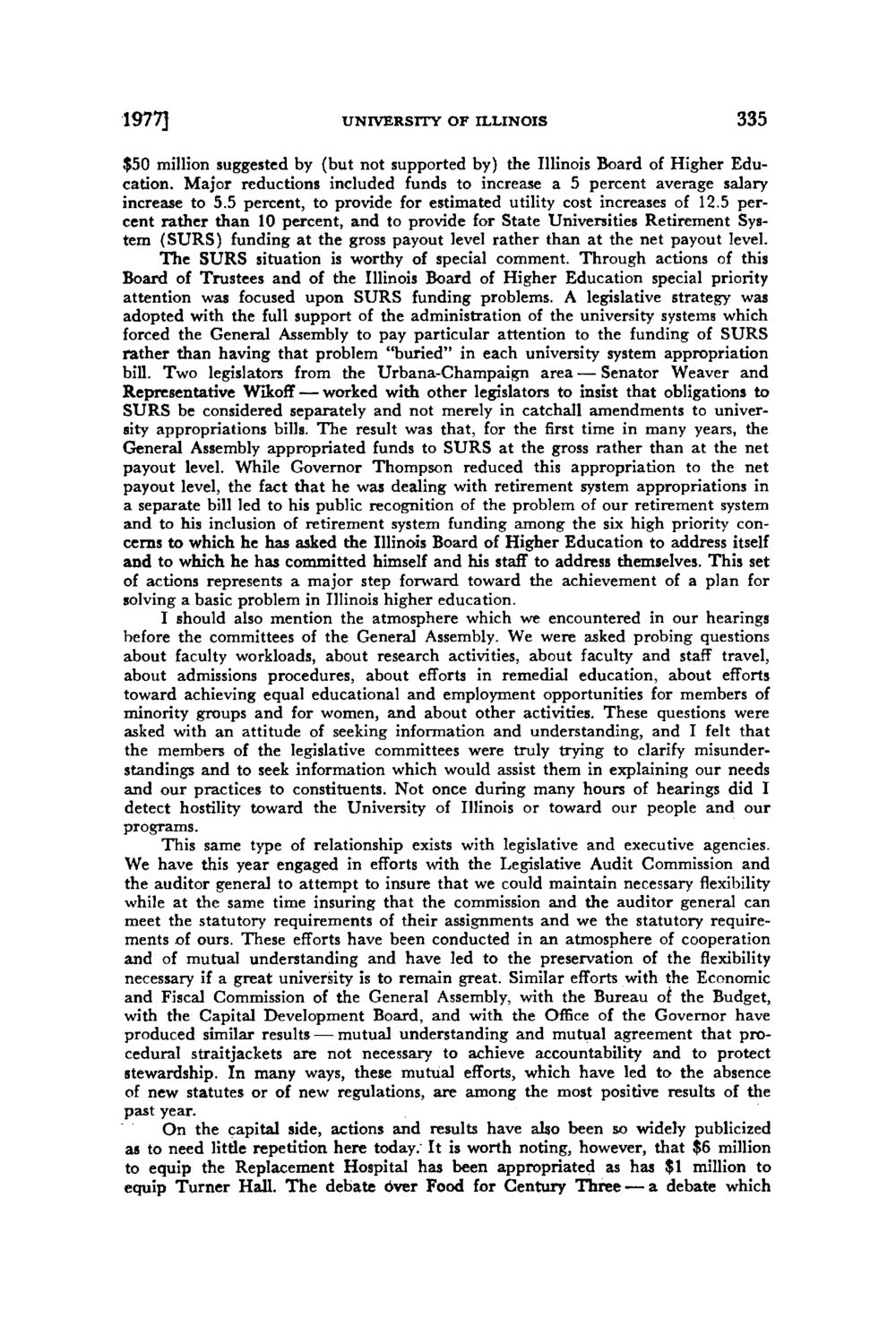| |
| |
Caption: Board of Trustees Minutes - 1978
This is a reduced-resolution page image for fast online browsing.

EXTRACTED TEXT FROM PAGE:
1977] UNIVERSITY OF ILLINOIS 335 $50 million suggested by (but not supported by) the Illinois Board of Higher Education. Major reductions included funds to increase a 5 percent average salary increase to 5.5 percent, to provide for estimated utility cost increases of 12.5 percent rather than 10 percent, and to provide for State Universities Retirement System (SURS) funding at the gross payout level rather than at the net payout level. The SURS situation is worthy of special comment. Through actions of this Board of Trustees and of the Illinois Board of Higher Education special priority attention was focused upon SURS funding problems. A legislative strategy was adopted with the full support of the administration of the university systems which forced the General Assembly to pay particular attention to the funding of SURS rather than having that problem "buried" in each university system appropriation bill. Two legislators from the Urbana-Champaign area — Senator Weaver and Representative Wikoff — worked with other legislators to insist that obligations to SURS be considered separately and not merely in catchall amendments to university appropriations bills. The result was that, for the first time in many years, the General Assembly appropriated funds to SURS at the gross rather than at the net payout level. While Governor Thompson reduced this appropriation to the net payout level, the fact that he was dealing with retirement system appropriations in a separate bill led to his public recognition of the problem of our retirement system and to his inclusion of retirement system funding among the six high priority concerns to which he has asked the Illinois Board of Higher Education to address itself and to which he has committed himself and his staff to address themselves. This set of actions represents a major step forward toward the achievement of a plan for solving a basic problem in Illinois higher education. I should also mention the atmosphere which we encountered in our hearings before the committees of the Genera] Assembly. We were asked probing questions about faculty workloads, about research activities, about faculty and staff travel, about admissions procedures, about efforts in remedial education, about efforts toward achieving equal educational and employment opportunities for members of minority groups and for women, and about other activities. These questions were asked with an attitude of seeking information and understanding, and I felt that the members of the legislative committees were truly trying to clarify misunderstandings and to seek information which would assist them in explaining our needs and our practices to constituents. Not once during many hours of hearings did I detect hostility toward the University of Illinois or toward our people and our programs. This same type of relationship exists with legislative and executive agencies. We have this year engaged in efforts with the Legislative Audit Commission and the auditor genera] to attempt to insure that we could maintain necessary flexibility while at the same time insuring that the commission and the auditor general can meet the statutory requirements of their assignments and we the statutory requirements of ours. These efforts have been conducted in an atmosphere of cooperation and of mutual understanding and have led to the preservation of the flexibility necessary if a great university is to remain great. Similar efforts with the Economic and Fiscal Commission of the General Assembly, with the Bureau of the Budget, with the Capital Development Board, and with the Office of the Governor have produced similar results — mutual understanding and mutual agreement that procedural straitjackets are not necessary to achieve accountability and to protect stewardship. In many ways, these mutual efforts, which have led to the absence of new statutes or of new regulations, are among the most positive results of the past year. On the capital side, actions and results have also been so widely publicized as to need little repetition here today.' It is worth noting, however, that $6 million to equip the Replacement Hospital has been appropriated as has $1 million to equip Turner Hall. T h e debate over Food for Century Three — a debate which
| |